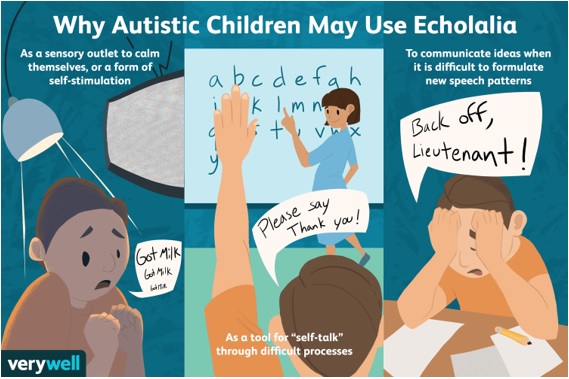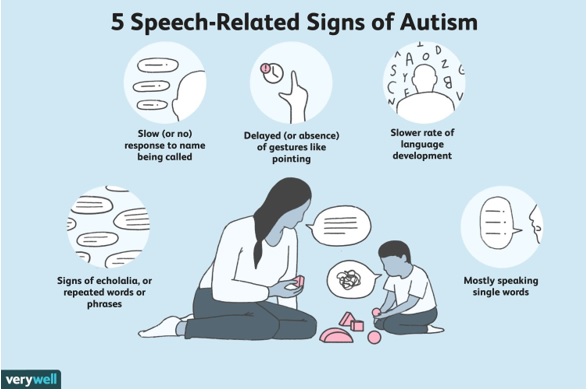Echolalia And ADHD: Understanding The Connection And Impact On Children's Lives
26th July 2023

Echolalia is a fascinating and often misunderstood phenomenon involving the repetition of words or phrases spoken by others. It can be a normal part of language development in young children, but when it persists beyond a certain age or is associated with other developmental disorders, such as Attention Deficit Hyperactivity Disorder (ADHD), it requires closer examination. In this essay, we will explore the concept of echolalia, its different types, the connection between ADHD and echolalia, symptoms and signs in children with ADHD, and the impact of echolalia on their lives.
What is Echolalia
The term has a Greek origin and is a combination of two words- ‘echo’ and ‘lalia’ meaning ‘to repeat’ and ‘speech’ respectively. It refers to the automatic repetition of vocalizations made by others, either immediately after hearing them or later. It can manifest in two primary forms: immediate echolalia, where a child repeats words or phrases instantly after hearing them and delayed echolalia, in which the repetition occurs after some time has passed. While echolalia is typically observed in children with language delays or Autism Spectrum Disorder (ASD), it can also be present in children with ADHD.
Types of Echolalia
There are several different types of echolalia and the terms can be a bit confusing due to lack of understanding of this particular spectrum. Here are a few different types of echolalia.
- Functional Echolalia: This type of echolalia serves a communicative purpose for the child.
- Non-Functional Echolalia: Non-functional echolalia does not serve an immediate communicative purpose.
- Mitigated Echolalia: Here the child repeats the same words but with some slight changes.
- Immediate or Delayed Echolalia: This describes the timing of the repetitive words.
The Connection Between ADHD and Echolalia

Source: www.verywellhealth.com
While echolalia is more commonly associated with ASD, some studies have found a connection between ADHD and echolalia, particularly in children with both conditions. ADHD is a neurodevelopmental disorder characterized by inattention, hyperactivity, and impulsivity. The link between ADHD and echolalia may be due to shared neural pathways or overlapping cognitive processes involved in language and attention regulation.
Symptoms and Signs of Echolalia in Children with ADHD

Source: www.verywellhealth.com
Children with ADHD who exhibit echolalia may display the following symptoms and signs:
- Repetitive Speech
They may repeat phrases heard from others, either immediately or with a delay, even if the context does not warrant it.
- Difficulty with Communication
Echolalia can interfere with effective communication. The child may struggle to initiate or sustain conversations, relying on repetitive phrases instead.
Before moving forward, can we ask you a question? Do you follow us on Social Media? We regularly share upgraded educational content, tips, feedback, and more. Check us out by clicking the profiles here - Facebook / Twitter / LinkedIn / Pinterest / Instagram / YouTube
- Co-morbid Language Delays
Some children with ADHD and echolalia may also have language delays, which further contribute to their communication challenges.
- Context-Inappropriate Responses
Echolalia may lead to inappropriate responses in social situations, as the repeated phrases might not fit the conversation or context.
The Impact of Echolalia on Children's Lives
Echolalia can have various impacts on the lives of children with ADHD:
- Social Challenges
Difficulty with communication can lead to social isolation and difficulties in forming meaningful relationships with peers.
- Academic Performance
Echolalia may interfere with classroom learning, as the child's repetitive speech can be distracting to both the child and their classmates.
- Self-Esteem Issues
Children with echolalia may become aware of their different communication styles, leading to self-esteem issues and a sense of being different from their peers.
- Misunderstanding and Frustration
Others may misinterpret echolalia as defiance or lack of understanding, leading to frustration for both the child and those around them.
Understand Students With Echolalia
Echolalia, though not exclusive to Autism Spectrum Disorder, can also be present in children with ADHD. Pursue a Certificate in special education course to understand the connection between ADHD and echolalia is essential for providing appropriate support and intervention for affected children. Early detection and targeted therapies can help improve communication skills, social interactions, and overall quality of life for children with ADHD and echolalia. By creating a supportive and understanding environment, we can ensure these children have the best chance to thrive and reach their full potential.
Find the right course for you and try out the course. WhatsApp us at - +916292137532. You can also mail us at act@asiancollegeofteachers.com.








